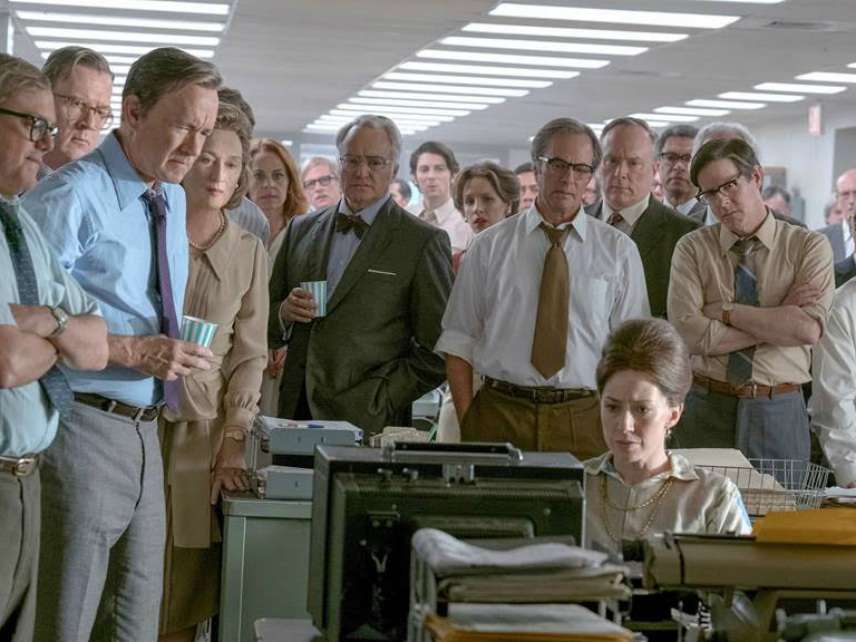Movie Review: The Post
Meryl Streep and Tom Hanks fight the power in Steven Spielberg's '70s journo-drama.

The Post doesn't do the one key thing that director Steven Spielberg apparently hoped it would. In Spielberg's view, the 1971 attempt by the Nixon Administration to prevent The New York Times and The Washington Post from publishing the purloined Pentagon Papers was analogous to Donald Trump's hostile mockery of the mainstream press of today. But the leaking of the Pentagon Papers—a damning RAND Corporation analysis of 22 years of U.S. interference in Southeast Asia—was seen as a major First Amendment issue by the two newspapers, framed as a violation of the Espionage Act by the administration, and ultimately had to be adjudicated by the Supreme Court. (The newspapers won.) Trump hasn't attempted anything like this (yet); and it should also be noted that he's not the only American mocking the press these days.
So Spielberg's intention to make a chiming connection between that era and this one doesn't hold up. What he has produced instead is a rather old-fashioned movie about constitutional idealism—a big-league-journalism drama that inevitably lacks the thrills of the more sinister Watergate classic, All the President's Men.
Which is not to say that The Post is a bad movie. Being a Spielberg film, it has the gratifications of a seamlessly well-made feature. And it's so deftly edited that it often feels thrilling as it wings along through its talk-centric story. Best of all, it has Meryl Streep, giving one of her master-class performances as the late Washington Post publisher Katharine Graham, who was prepared to sacrifice her paper on the altar of freedom of the press. Graham was a diffident and insecure woman: her father had left the Post to her husband, Philip, rather than to his own daughter—who wound up running the paper, to the dismay of its all-male board, only after Philip's suicide. Streep's great accomplishment here is to compel our attention—by the subtlest of means—as this initially submissive woman slowly blossoms into the person who was strong enough to make the most important decision in her paper's history.
The rest of the cast is very fine: Tom Hanks as Post executive editor Ben Bradlee (the role played by Jason Robards in All the President's Men); Bob Odenkirk as indefatigable reporter Ben Bagdikian, who enabled the Post to elbow its way into the Pentagon Papers story after The New York Times initially broke it; Michael Stuhlbarg as Times managing editor Abe Rosenthal, another First Amendment warrior; and Bruce Greenwood, who portrays Robert McNamara, a conflicted Secretary of Defense during the Vietnam years, with shining sensitivity.
Spielberg sketches in the story's background with brisk efficiency. He starts in 1966, with Daniel Ellsberg (Matthew Rhys), a RAND Corporation "observer," moving through a Vietnam jungle along with the U.S. troops with whom he is embedded. Ellsberg has become familiar with the scaffolding of lies upon which the Vietnam debacle has been built, and he is now completely opposed to the war. He steals and copies part of a voluminous Pentagon analysis of the long-running conflict—a story rife with rigged elections, covert operations, and Geneva Convention violations—and makes it available to a Times reporter.
Spielberg has Bradlee becoming aware that something big is up at the rival paper for the wispiest of reasons (he saw the Times's Rosenthal looking "mighty smug"). Maybe it did happen that way, but it's not persuasive as presented here. Nor is Bradlee's impulsive decision to dispatch a young staffer to the Times building in New York to just hang around and report back on what he hears or sees. (As it happens, he does see something.)
The Post will probably be popular among media people—it's about them. The movie isn't any kind of masterpiece, though. Spielberg shot it very quickly while still working on his next film, Ready Player One, and there are a few parts, especially toward the end, that might have benefitted from further thought. (For instance, the scene in which Graham descends the steps of the Supreme Court in triumph while a crowd of young women gazes at her in goopy adoration.) But the picture has some memorable scenes, too, chief among them the ones in which Bradlee contemplates the shifting shadows of journalistic morality. (The real Bradlee was a weekly White House dinner guest during the Kennedy years.) And Sarah Paulson, who has a small role as Bradlee's wife, Tony, has a resonant moment when she explains to her husband that he's no hero for pushing Graham to publish the Pentagon papers. He has nothing to lose, she says: he'll always be acclaimed, and can always get another job. Graham, a woman alone in a disapproving man's world, is risking everything.


Show Comments (44)